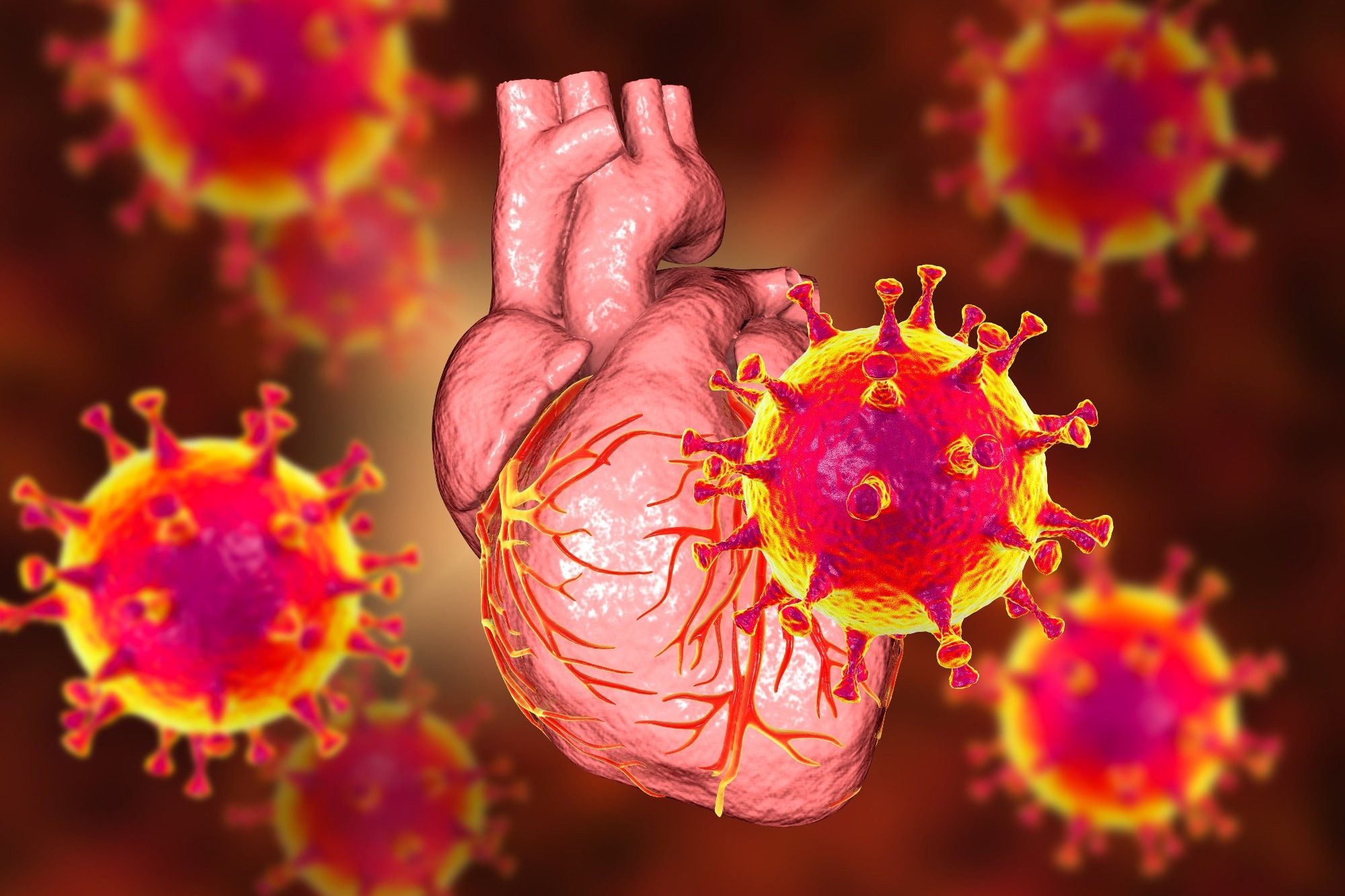Recent studies have shown that long-term cardiac symptoms associated with severe acute respiratory syndrome coronavirus 2 (SARS-CoV-2) infection can persist for months or even years. Chest discomfort, inflammatory heart disease, and arrhythmia, among other symptoms, are frequently observed. Heart muscle inflammation, or myocarditis, which can be directly caused by a viral infection, can progress to manifest into subclinical or overt myocardial dysfunction with or without electrophysiological abnormalities having long-term consequences. The intensity and timespan of such cardiac symptoms differ from patient to patient. Detecting its risk factors is an important and active area of research that can inform the monitoring and treatment of such symptoms and reduce the burden of eventual illness and mortality among COVID-19 survivors.
 Study: Long-term cardiac symptoms following COVID-19: a systematic review and meta-analysis. Image Credit: Kateryna Kon / Shutterstock
Study: Long-term cardiac symptoms following COVID-19: a systematic review and meta-analysis. Image Credit: Kateryna Kon / Shutterstock

 *Important notice: medRxiv publishes preliminary scientific reports that are not peer-reviewed and, therefore, should not be regarded as conclusive, guide clinical practice/health-related behavior, or treated as established information.
*Important notice: medRxiv publishes preliminary scientific reports that are not peer-reviewed and, therefore, should not be regarded as conclusive, guide clinical practice/health-related behavior, or treated as established information.
About the study
In the present study, researchers assessed and synthesized relevant information from studies that described the long-term cardiac symptoms observed after COVID-19.
The team performed a systematic review in accordance with the Preferred Reporting Items for Systematic Reviewers and Meta-Analysis (PRISMA) criteria. Long COVID-19 was described as symptoms lasting four weeks or more since the follow-up index date, which included symptom onset, admission to a hospital, and hospital discharge. Furthermore, the team conducted the initial search across two preprint servers and seven electronic databases between 1 January 2020 and 10 May 2021. Covidence is a web-based collaborative software platform that facilitated the development of systematic and other literature assessments and was utilized for the article screening procedure.
A modified version of the Newcastle–Ottawa scale (NOS) was designed to assess the quality of seven elements for each research, including sample size, sampling representativeness, exposure assessment, covariate evaluation, outcome assessment, statistical analysis, and follow-up. The quality of every item was rated as "good," "fair," or "poor," and a score was determined. The team employed R (version 4.2.2) for all analyses. The percentage of commonly observed cardiac symptoms was computed as the proportion of COVID-19 survivors reporting a particular cardiac symptom per the total proportion of COVID-19 survivors.
Results
The present systematic review examined 101 studies related to long-term cardiac symptoms after COVID-19, of which 92 provided sufficient data for meta-analysis. These studies assessed 49 distinct long-term cardiac symptoms observed post-COVID-19, with chest discomfort and arrhythmia being the most often studied symptoms. More than two-thirds of all the studies involved prospective cohorts, while 14 included retrospective and 15 performed cross-sectional research. Most of the research involved online surveys, regional studies, and multiple- or single-hospital studies.
Approximately 60% of studies had a sample size between 100 and 999 participants, while 28% involved a minimum of 1,000 participants. The majority of studies clinically confirmed SARS-CoV-2 infections. Long-term cardiac symptoms were examined clinically or reported by the patient. The index dates of the follow-up periods differed between studies. Additionally, inpatients were recruited by 45 studies, outpatients by 15 studies, and inpatients as well as outpatients by 35 studies. The majority of studies involved COVID-19 patients irrespective of severity, while the tools employed to measure severity differed considerably.
Five or more studies documented ten cardiac symptoms, including chest discomfort, arrhythmia, cardiac abnormalities, hypertension, myocardial damage, stroke, thromboembolism, heart failure, myocarditis, and coronary disease. For these symptoms, both random-effects, as well as fixed-effects meta-analyses were also performed. All symptoms showed significant variation between the studies. A random-effects model described the pooled proportion of cardiac symptoms, including chest pain, hypertension, arrhythmia, cardiac abnormalities, thromboembolism, myocardial damage, stroke, coronary disease, myocarditis, and heart failure.
After stratification, heterogeneity remained significantly high for most symptoms from the stratum. Studies having the lowest quality score, weakest sampling strategies, cross-sectional techniques, and smallest sample size indicated the highest prevalence of both symptoms. For instance, the proportion of COVID-19 survivors who had chest discomfort varied from 21.32% in low-quality, 9.26% in medium-quality, to 4.04% in high-quality score analyses. Similar trends were also observed for other symptoms; however, the small proportion of studies in some strata hindered formal analysis.
Conclusion
The study findings highlighted a variety of heart symptom presentations observed after COVID-19, many of which might endure for months or even a year. There is considerable variety in research design and significant variation in the proportion of symptoms reported by study features. The researchers believe that the limits of the existing research hinder a greater knowledge of long COVID-19 at this time. The present research demonstrated the necessity for high-quality studies on long COVID-19 and the need for long-term cardiac monitoring for COVID-19 survivors.

 *Important notice: medRxiv publishes preliminary scientific reports that are not peer-reviewed and, therefore, should not be regarded as conclusive, guide clinical practice/health-related behavior, or treated as established information.
*Important notice: medRxiv publishes preliminary scientific reports that are not peer-reviewed and, therefore, should not be regarded as conclusive, guide clinical practice/health-related behavior, or treated as established information.
Journal reference:
- Preliminary scientific report.
Long-term cardiac symptoms following COVID-19: a systematic review and meta-analysis, Boya Guo, Chenya Zhao, Mike Z He, Camilla Senter, Zhenwei Zhou, Jin Peng, Song Li, Annette L Fitzpatrick, Sara Lindstroem, Rebecca C Stebbins, Grace A. Noppert, Chihua Li, medRxiv 2023.01.16.23284620, DOI: https://doi.org/10.1101/2023.01.16.23284620, https://www.medrxiv.org/content/10.1101/2023.01.16.23284620v1